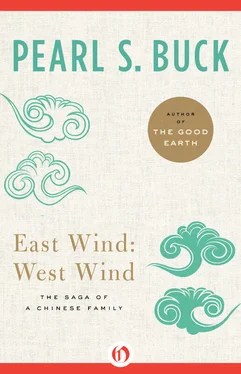When I asked him how I could unbind my feet, I thought, of course, that he would merely give me directions from his medical knowledge. And so I sat astounded when he himself fetched a basin of hot water and a roll of white bandage. I was ashamed. I could not endure having him see my feet. No one had seen them since I was old enough to care for them myself. Now, when he set the basin on the floor and knelt to take my feet, my whole body burned.
“No,” I said faintly. “I will do it myself.”
“You must not mind,” he answered. “I am a doctor, you remember.”
Still I refused. Then he looked me steadfastly in the face.
“Kwei-lan,” he said gravely, “I know it costs you something to do this for me. Let me help you all I can. I am your husband.”
Without a word then, I yielded. He took my foot, and gently he withdrew the shoe and the stocking and unwound the inner cloth. His expression was sad and stern.
“How you have suffered!” he said in a low, tender voice; “how wretched a childhood — and all for nothing!”
The tears came into my eyes at his words. He was making useless all the sacrifice, and even demanding a new sacrifice!
For when my feet had been soaked and bound again more loosely, intolerable suffering set in. Indeed, the unbinding process was almost as painful as the binding had been. My feet, accustomed to constriction, gradually stretched a little, and the blood began to circulate.
There were times in the day when I tore at the bandages to unfasten them and bind them more tightly to ease me; and then the thought of my husband and that he would know at night made me replace them with trembling hands. The only slight respite I could get was to sit on my feet and rock back and forth.
No longer did I care how I appeared before my husband, or look in the mirror to see if I were at least fresh and neat. At night my eyes were swollen with weeping, and my voice rough with sobs I could not control. Strange that when my beauty could not move him, my distress did! He would comfort me as though I were a child. I clung to him often without realizing in my pain who or what he was.
“We will endure this together, Kwei-lan,” he said. “It is hard to see you suffer so. Try to think that it is not only for us but for others, too — a protest against an old and wicked thing.”
“No!” I sobbed, “I do it only for you — to be a modern woman for you!”
He laughed and his face lighted a little, as it had when he talked to that other woman. This was my reward for pain. Nothing seemed quite so hard afterwards.
And indeed, as the flesh grew more healthy, I began to know a new freedom. I was young, and my feet were yet sound. Often in older women bound feet will mortify and sometimes even drop away. But mine were only numbed. Now I began to walk more freely, and the stairs were not so difficult. I felt stronger all over my body. One evening I ran without thinking into the room where my husband was writing. He looked up in surprise, and his face broke into a smile.
“Running?” he exclaimed. “Ah, well, we are over the worst then, and the bitterness is eaten.”
I looked at my feet in surprise.
“But they are not yet as large as Mrs. Liu’s,” I said.
“No, they never can be,” he replied. “Hers are natural feet. Yours are as large as we can get them, now.”
I felt a little sorrowful that my feet could never be as large as hers. But I thought of a way. Since all my little embroidered shoes were useless now, I determined to get some new leather ones like Mrs. Liu’s. The next day, therefore, I went with a servant to a shop and bought a pair of shoes the length I wished. They were two inches longer than my feet, but I stuffed the toes hard with cotton. When I put on the shoes no one could tell I had had bound feet.
I was anxious to have Mrs. Liu see them, and I asked my husband when I might return her call.
“I will go with you to-morrow,” he said.
I was surprised that he would be willing to go on the street with me. It is certainly not good custom, and it embarrassed me not a little, but I have grown more used now to his doing strange things.
We went the next day therefore, and my husband treated me most kindly in her presence. True, he confused me greatly once or twice, as for instance, when he made me precede him into the room where Mrs. Liu was. I did not know his meaning at the time. After we came home, he explained that it was the western manner.
“Why?” I asked. “Is it because, as I have heard, that men are inferior to women over there?”
“No,” he answered, “that is not true.”
Then he explained it to me. It is grounded, he said, in an old system of courtesy which began in ancient times. This was very astonishing to me. I did not know that there were ancient people except ours, that is, civilized people. But it seems that foreigners also have a history and a culture. They are therefore not wholly barbarian. My husband promised to read me some books about them.
I felt happy that night when I went to bed. It was interesting to be a little more modern. For not only had I worn my leather shoes that day, but I had not painted my face or put ornaments in my hair. I looked very much like Mrs. Liu. I am sure my husband noticed it.
It seemed that, once I was willing to change, a complete new life poured in upon me. My husband began to talk to me in the evening, and I found his conversation very exciting. He knows everything. Yoh! The queer things he has told me about the outer countries and their inhabitants! He laughed when I exclaimed,
“Oh, funny — oh, strange!”
“No more strange than we are to them,” he said, for some reason greatly amused.
“What!” I cried in fresh astonishment. “Do they think we are funny?”
“Of course,” he replied, still laughing. “You should hear them talk! They think our clothes are funny and our faces and our food and all that we do. It does not occur to them that people can look as we do and behave as we do, and be wholly as human as they are.”
I was astounded to hear this. How could they consider their curious looks and clothes and behavior as human as ours? I answered with dignity,
“But we have always done these things and had these customs and looked as we do, with black hair and eyes—”
“Exactly! So have they!”
“But I thought they came over here to our country to learn civilization. My mother said so.”
“She was mistaken. In fact, I believe they come over here thinking to teach us civilization. They have a great deal to learn from us, it is true, but they don’t know it any more than you realize what we have to learn from them.”
Certainly it was all very novel and interesting, what he had to say. I never grew weary of hearing about the foreigners, and especially did I like to hear of all their marvelous inventions: of turning a handle and getting hot or cold water out of it, and of a stove with no fuel that one could see, and yet having heat — self-coming water and self-coming heat, these are called. And how amazed was I at his stories of machines on the sea and of others flying in the air and floating under the water and many like marvels!
“You are sure it is not magic?” I asked fearfully. “The old books tell of miracles of fire and earth and water but they are always the magic tricks of creatures partly faërie.”
“No, of course it is not magic,” he replied. “It is all quite simple when you understand how it is done. It is science.”
That science again! It made me think of my brother. For the sake of that science he is still in these foreign countries, eating their food and drinking their water to which his body is not accustomed by birth. I became very curious to see this science and know what it looks like. But when I said this my husband laughed a great deal.
Читать дальше











